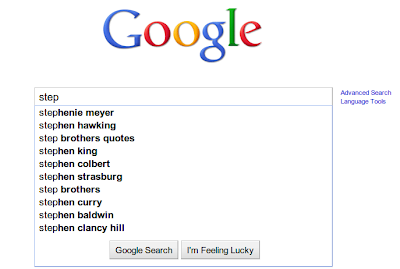It's this:

The top search suggestion on Google for 'step' is Stephenie Meyer! Take a look at the people 'below' her - the second name is Stephen Hawking, and two steps down, there's Stephen King, who is one of the best writers of horror fiction. And as for Hawking....
My sister gave me Stephen Hawking's "A Brief History of Time" for my 16th birthday. I don't think I've ever held a book so reverently, or learnt so much from a single book after that. In it, Dr.Hawking presents cosmological concepts and theories in a simple narrative style, chapter after chapter. When I studied cosmology in M.Sc, I found that the theories in the book are a little oversimplified. But why did I study cosmology? Stephen Hawking was definitely a reason. His book is an inspiration to thousands, if not millions of young students. It is also an excellent resource for the even larger population who are curious about the Universe but have lost touch with mathematics.
So, what do I have against Stephenie Meyer? Absolutely nothing, except that all she has done is write the Twilight 'Saga.' (ugh)
I don't hate Twilight because hating it is fashionable. I hate it because I did read the books - I read the 50-odd pages in the first three books that remain if you skip the 'Edward is so handsome' parts. As for Breaking Dawn, I read it till the wedding and stopped because my pharyngeal reflex works. Talking about the Twilight 'Saga' is redundant, as the bad writing, sexism, and sparkly vampires in it have been discussed very well.
When more people are interested in the person who wrote Twilight than the person who wrote A Brief History of Time, all I can say is:
நிலைகெட்ட மனிதரை நினைத்துவிட்டால்'











